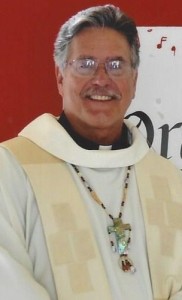…from your Pastor’s Desk
“Who do people say that the Son of Man is?”
“He’s a man, he’s just a man,” sang Mary Magdalene in the musical Jesus Christ Superstar. It is one answer to the question, Who is Jesus Christ?
“We’re more popular than Jesus now; I don’t know which will go first, rock ’n’ roll or Christianity,” said John Lennon of the Beatles on a famous occasion. Later he explained that it was a comment on society and not on Jesus. Many people through the ages have imagined how Jesus would be received if He were to appear in modern society. In most scenarios society comes out looking bad. Thomas Carlyle, the 19th-century historian wrote, “If Jesus Christ were to come today, people would not even crucify him. They would ask him to dinner, and hear what he had to say, and make fun of it.”
But “Who do people say I am?” was only a preliminary question; the real question was “Who do you say I am?” The first question is easily answered; one has only to be a reporter of the comments of others. But the second question is a searching one; and only a disciple can come anywhere within range of an answer.
When we recite the Creed at Mass we give the Church’s answer. “We believe in one Lord, Jesus Christ, the only Son of God, eternally begotten of the Father, God from God, Light from Light, true God from true God, begotten, not made, of one Being with the Father….”
However, the mere repetition of a right answer is not the answer. We found out in grade school that the right answer given at the end of a math test was useless unless we reached it by valid steps ourselves [show your work]. We don’t just repeat the Creed; we profess it. It is more than a set of theoretical statements; it is a commitment and a renewal of faith. This is more demanding [show your work]. We cannot ‘find’ Jesus in the way you find some lost object, or a piece of information. In a sense, the seeking has to continue even when we have found him, and especially then.
There are different kinds of seeking. There is a seeking to know, and there is a seeking to find. These need not be opposed to each other, but they can be. The first is about possessing knowledge, the second is about possessing a reality. The first engages the mind, the second, one’s life. The Wise Men “sought diligently for the child,” they asked everyone about him, but when they found Him they “they knelt down and paid him homage” (Matthew 2:11).
After the Resurrection, the disciples met in pairs and in groups and they told one another of their experiences: Mary Magdalene “went and told the disciples that she had seen the Lord and that he had said these things to her” (John 20:18); “the disciples said, ‘we have seen the Lord'” (John 20:25); the disciples returning from Emmaus “told their story of what had happened on the road and how they had recognized him at the breaking of bread” (Luke 24:35).
When we meet in His name, be it digitally or geographically, we are responding to his question, “Who do you say that I am?” and sharing our experience of him with our brothers and sisters. And our hope then is, when we stand before the throne, Jesus will say this of us…’You… Are Mine’.
Father Ron

